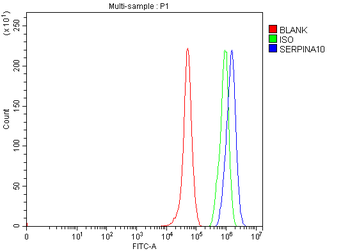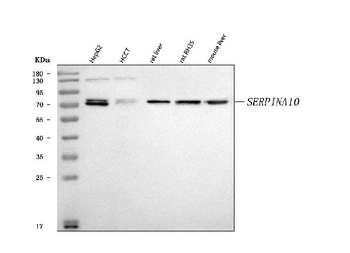You have no items in your shopping cart.
Anti-ZPI/SERPINA10 Antibody
Catalog Number: orb1402093
| Catalog Number | orb1402093 |
|---|---|
| Category | Antibodies |
| Description | Anti-ZPI/SERPINA10 Antibody. Tested in ELISA, Flow Cytometry, WB applications. This antibody reacts with Human, Mouse, Rat. |
| Species/Host | Rabbit |
| Clonality | Polyclonal |
| Tested applications | ELISA, FC, WB |
| Reactivity | Human, Mouse, Rat |
| Isotype | Rabbit IgG |
| Immunogen | E.coli-derived human ZPI/SERPINA10 recombinant protein (Position: L128-E427). |
| Antibody Type | Primary Antibody |
| Concentration | Adding 0.2 ml of distilled water will yield a concentration of 500 μg/ml. |
| Form/Appearance | Lyophilized |
| Conjugation | Unconjugated |
| MW | 71 kDa |
| UniProt ID | Q9UK55 |
| Storage | Maintain refrigerated at 2-8°C for up to 2 weeks. For long term storage store at -20°C in small aliquots to prevent freeze-thaw cycles. |
| Alternative names | Phosphopantothenate--cysteine ligase, Phosphopanto Read more... |
| Note | For research use only |
| Application notes | Western blot, 0.25-0.5 μg/ml, Human, Mouse, Rat Flow Cytometry (Fixed), 1-3 μg/1x106 cells, Human ELISA, 0.1-0.5 μg/ml, -. Adding 0.2 ml of distilled water will yield a concentration of 500 μg/ml |
| Expiration Date | 12 months from date of receipt. |

Flow Cytometry analysis of HEL cells using anti-ZPI/SERPINA10 antibody. Overlay histogram showing HEL cells (Blue line). To facilitate intracellular staining, cells were fixed with 4% paraformaldehyde and permeabilized with permeabilization buffer. The cells were blocked with 10% normal goat serum. And then incubated with rabbit anti-ZPI/SERPINA10 Antibody (1 µg/1x10^6 cells) for 30 min at 20°C. DyLight®488 conjugated goat anti-rabbit IgG (5-10 µg/1x10^6 cells) was used as secondary antibody for 30 minutes at 20°C. Isotype control antibody (Green line) was rabbit IgG (1 µg/1x10^6) used under the same conditions. Unlabelled sample without incubation with primary antibody and secondary antibody (Red line) was used as a blank control.

Flow Cytometry analysis of RT4 cells using anti-ZPI/SERPINA10 antibody. Overlay histogram showing RT4 cells (Blue line). To facilitate intracellular staining, cells were fixed with 4% paraformaldehyde and permeabilized with permeabilization buffer. The cells were blocked with 10% normal goat serum. And then incubated with rabbit anti-ZPI/SERPINA10 Antibody (1 µg/1x10^6 cells) for 30 min at 20°C. DyLight®488 conjugated goat anti-rabbit IgG (5-10 µg/1x10^6 cells) was used as secondary antibody for 30 minutes at 20°C. Isotype control antibody (Green line) was rabbit IgG (1 µg/1x10^6) used under the same conditions. Unlabelled sample without incubation with primary antibody and secondary antibody (Red line) was used as a blank control.

Western blot analysis of SERPINA10 using anti-SERPINA10 antibody. Electrophoresis was performed on a 5-20% SDS-PAGE gel at 70V (Stacking gel) / 90V (Resolving gel) for 2-3 hours. The sample well of each lane was loaded with 30 ug of sample under reducing conditions. Lane 1: human HepG2 whole cell lysates, Lane 2: human hepatocellular carcinoma tumor tissue (HCCT) lysates, Lane 3: rat liver tissue lysates, Lane 4: rat RH-35 whole cell lysates, Lane 5: mouse liver tissue lysates. After electrophoresis, proteins were transferred to a nitrocellulose membrane at 150 mA for 50-90 minutes. Blocked the membrane with 5% non-fat milk/TBS for 1.5 hour at RT. The membrane was incubated with rabbit anti-SERPINA10 antigen affinity purified polyclonal antibody at 0.5 µg/mL overnight at 4°C, then washed with TBS-0.1% Tween 3 times with 5 minutes each and probed with a goat anti-rabbit IgG-HRP secondary antibody at a dilution of 1:5000 for 1.5 hour at RT. The signal is developed using an Enhanced Chemiluminescent detection (ECL) kit with Tanon 5200 system. A specific band was detected for SERPINA10 at approximately 71 kDa. The expected band size for SERPINA10 is at 51 kDa.
Anti-ZPI/SERPINA10 Antibody [orb2591574]
ELISA, FC, WB
Human, Mouse, Rat
Rabbit
Polyclonal
iFluor647
100 μg



